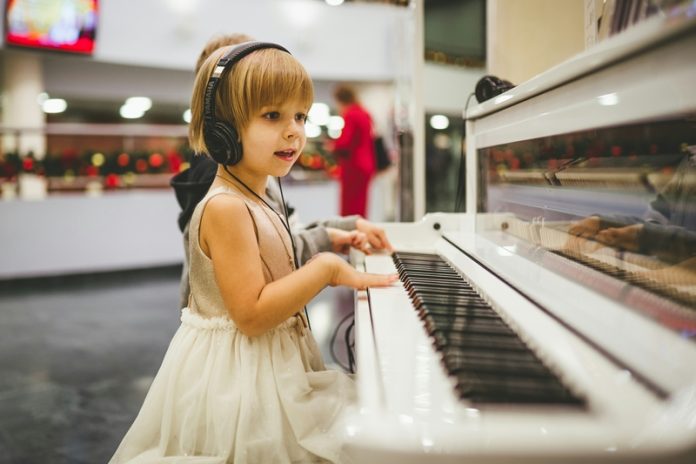While the famous 1993 study dubbed “The Mozart Effect” didn’t truly provide concrete evidence that you can make your child smarter just by listening to Mozart’s music, countless other studies suggest that listening to and making music has a positive effect on a child’s mental and emotional development.
In UNICEF’s Mini Parenting Masterclass episode, music expert and lecturer Dr Ibrahim Baltagi explains the role of music in a child’s growth and progress, which starts even before a baby is born. Around the 16th month mark of a pregnancy, for example, a baby is already able to hear their first sound, and the heart rate of a newborn can slow down when it’s soothed by a mother’s lullaby.
Some children have a natural affinity for music, or an early inclination, interest, or aptitude towards musical activities. It would be a good idea for a parent like you to encourage your child’s natural affinity for music if you perceive them acting upon it, for example by reacting enthusiastically to various musical stimuli.
The quest to develop your child’s affinity for music starts at home, but it can be reinforced through a music-based preschool programme. Kinderland in Singapore, for instance, uses a thematic music-infused curriculum designed to optimise your child’s overall advancement. A music-oriented education at Kinderland combines the use of musical instruments, singing, and rhythmic training to further nurture your child’s love for music, and if you’re interested in how the programme can help children develop their musical potential, check out sources like Kinderland’s Instagram.
Here’s more information that will allow you to get to know your preschooler’s natural affinity for music and reap the benefits of a music-oriented preschool education:

Signs that Your Preschooler Has an Affinity for Music
How would you know if your child has a love for music that could play a huge part in their personal growth? Here are a few signs that indicate a preschooler’s inclination for music:
1) Your Child Loves to Sing, Dance, or Play Instruments
One of the first signs that a preschooler has a special affinity for music is their active engagement in singing, dancing, or playing instruments. These activities indicate a genuine interest in the world of sound and rhythm. You might catch your little one humming a tune, twirling around the room, or enthusiastically banging on some makeshift drums.
2) Your Child Is Responsive to Rhythm
A preschooler’s positive response to rhythm, as well as their early ability to sense it virtually anywhere, is also a key indicator of their affinity to music. They might be clapping hands, tapping their feet, or swaying happily to a beat to express an innate connection to the rhythmic and musical elements around them.
3) Your Child Demonstrates Good Musical Memory
Good musical memory is often linked to a natural affinity for music. If your preschooler can easily remember and recall tunes, lyrics, or rhythmic patterns, it shows an ability to connect with and retain musical information.
The Benefits of a Music-Oriented Education in Your Preschooler’s Life
If you need more reasons to encourage your child to pursue their inclination for music, here are just a few benefits that they’ll enjoy upon receiving a music-oriented education:
1) Music Will Enhance Your Child’s Cognitive Skills
Research suggests that exposure to music can significantly enhance cognitive skills in preschoolers. Musical activities stimulate various areas of the brain that promote improved memory, attention, and problem-solving abilities.
In a study conducted by the Stanford University School of Medicine, it was found that musicians who started learning their instruments as children showed a significantly more “connected” brain than musicians who picked up an instrument later in life. This just underscores why it’s good to expose your child to music at an early age.
2) Music Fast-Tracks Language Development in Kids
The connection between music and language development is profound. In fact, preschoolers who are allowed to explore and be proficient in music often show accelerated language acquisition skills.
Songs with repetitive patterns and rhymes, for example, contribute to vocabulary expansion and language expression. A study done by Politimou et al on the musical predictors of language development in preschoolers found that the rhythmic and melodic aspect of music is a predictor of phonological awareness and language grammar, respectively.
3) Music Improves a Child’s Motor Skills
Engaging in musical activities, such as clapping, dancing, or playing instruments, contributes to the improvement of both gross and fine motor skills in preschoolers. Meanwhile, dancing to music enhances children’s coordination and balance.
A two-year study done by Costa-Giomi, which surveyed whether music instruction improves fine motor abilities, revealed that children who received formal piano lessons for two years were able to show significant improvement in tasks that gauged their speed and accuracy when perceiving and responding to stimuli.
4) Music Lays a Strong Foundation for Learning Maths
Rhythmic patterns and mathematical concepts share quite a lot of common ground. That’s why exposure to music can build a strong foundation for preschoolers when it comes to mathematical understanding.
One meta-analysis published in Educational Studies that combined 50 years of research on maths and music integration proved that combining music with maths lessons resulted in significantly higher scores on tests.
The analysis combined 55 studies that involved a total of 78,000 young subjects, ranging from kindergarten to university-aged students. Thanks to music intervention, 73 percent of these students performed better than the students who did not receive any musical intervention at all.
Evidently, music can be more than just a minor subject in your preschooler’s curriculum. When it comes to early childhood education, music should be an integral part of their learning experience. With so many benefits that affect multiple aspects of your child’s development, music should be ever-present in your child’s life—both in school and at home.







